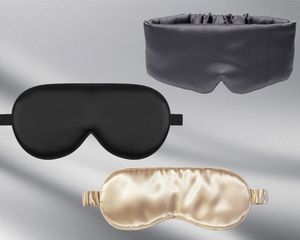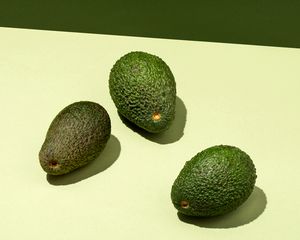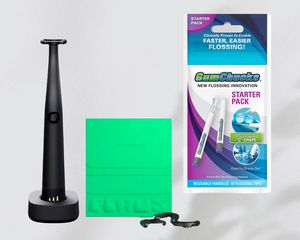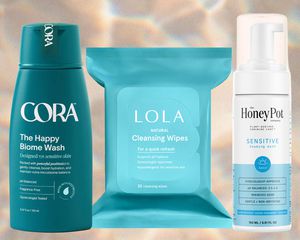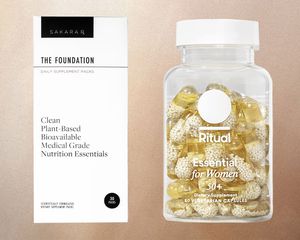:max_bytes(150000):strip_icc()/plantbasedcollagen-fabf5c73d76442d48e6fcdcd1ca4be4c.png)
Stocksy
It's probably fair to say that you've heard the buzz about collagen– it is quite literally everywhere. People swear by slathering it on their skin (although there are contradicting opinions on its efficacy), are putting it in their smoothies, mixing it in their coffee, and taking supplements of the skin-plumping ingredient. And while that's all well and good, especially if said people are seeing positive effects, there's one big issue. Most collagen is sourced from bovine, porcine, or fish, so what if you're vegan, vegetarian, or simply prefer an option that might be more planet-friendly?
That's where plant-based collagen comes in. But can it stand up to its animal-derived counterparts? And what's in it? To find out, we experimented with some of the many options ourselves and went to experts: nutritionist, Melissa Pfeister and nutrition coach, Karla De Epstein. Read on for their input.
Meet the Expert
- Melissa Pfeister is a Stanford Med Certified Nutritionist, and Founder of Stripped with Melissa.
- Karla De Epstein, M.S., C.N.C “Coach Karli” is the founder of MacroFIT by PeruvianPrincessFit as well as a Lifestyle Macro Coach, NPC athlete, and bikini fitness competitor.
What Is Collagen?
Collagen is a vital structural protein that makes up our bodies' connective tissues, which is about a third of the protein in our bodies overall. "Collagen is so important for us," explains Pfeister. "Not only is collagen a major component of our skin but it helps prevent bone loss, promote a healthy heart, and relieve joint pain. Collagen also keeps our skin from sagging," she adds. As we age, our bodies produce less collagen. That slowdown leads to external symptoms like loose skin and wrinkles, along with internal symptoms such as extended time for injuries to heal. Animal-derived collagen has been popular for nearly a decade now due to how well it holds up in studies for everything from improving osteoporosis to reducing wrinkles.
Collagen is available in a range of different formulations including powders, anti-wrinkle creams, pre-mixed with coffees, in pill form, and more. Similar to how probiotics now show up in random places like– popcorn and beer– once everyone realized we needed to consume them frequently, consumer demand grew and the same goes for collagen now. This brings us to the need for plant-based vegan collagen products. In recent years, plenty have hit the market promising to be just as effective as animal collagen. But are they?
What to Know About Animal Collagen
"In food, collagen is naturally found only in animal flesh like meat and fish that contain connective tissue. Collagen is also found in the bones and skin of fresh and saltwater fish. If I had to pick an animal protein, I’d say fish collagen because it is absorbed up to 1.5 times more efficiently into the body which means it has superior bio-availability over bovine or porcine types," explains De Epstein.
She goes on to add, "Another option for animal-derived collagen is bone broth. The process involves simmering animal bones in water and a small amount of vinegar (to help dissolve the bone and release collagen and minerals) for anywhere from 4 to 24 hours."
There’s nothing inherently wrong with animal collagen, as humans we have been reaping the innumerable benefits of consuming animal proteins seemingly forever. However, our meat-loving tendencies have not done our planet any favors. With the methane from cows as a contributor to greenhouse gas emissions and cattle raising in rainforests being responsible for 80% of Amazon deforestation, many climate scientists have urged us to shift focus towards eating more plants and less large animals. And that doesn’t even speak to the inhumane nature of industrial animal farming, which has led many people to eschew animal foods in favor of plant options.
There’s a market for vegan collagen because there’s a market for any plant-based alternative to an animal product. Whether that’s leather shoes or a burger, using more plants and fewer animals has the potential to help the planet and the lives of farm animals and ocean creatures.
What Are Most Plant-Based Collagens Made Of?
The surge of plant-based collagen in the consumer market may lead you to believe at first glance that it’s possible for collagen to naturally occur in plants. However, this is not the case; collagen protein contains an array of amino acids, the precise combination of which cannot be found anywhere in nature. "Vegan collagen doesn't come from animals, instead vegan collagen supplements sometimes come from more natural ingredients such as yeasts and bacteria, and oftentimes, vegan collagen doesn't actually contain collagen," explains De Epstein. Instead, vegan collagen "gives your body what it needs (amino acids, vitamins, minerals, etc) in order to boost your own collagen production; pretty much it supports your own body's natural functions."
It’s the same as when bone broth began trending, and suddenly “vegan bone broth” recipes popped up everywhere. Those broths don’t contain gelatin (the collagen protein in bone broth that makes it solidify when cold and is reparative for joints, bones, and skin), but rather assorted vitamins, amino acids, and minerals similar to some of the ones naturally found in the liquid left after boiling animal bones. The premise for vegan bone broth was that the ingredients in it promote the production of the nutrients found in bone broth if they don’t downright contain it.
In the same way that vegan bone broth can’t speed up injury recovery time like the collagen in real bone broth can, vegan collagen products should also be viewed as promoters or builders, and not as the real thing. Plant-based collagen promoters are typically composed primarily of vitamin C. That’s because vitamin C is an antioxidant that human bodies utilize to create collagen. It’s an essential cofactor for two of the enzymes needed for collagen synthesis. These collagen-building products assist with collagen production through vitamin C, silica, and numerous amino acids. Many brands of collagen builders are based on rice bran solubles, which can prevent the absorption of other ingredients. To get around that, some brands choose to use other ingredients such as adaptogens or amino acids like butterfly pea powder instead of rice bran.
Do Plant-Based Collagen Products Work?
There is no doubt vegan collagen promoters are effective to an extent. With vitamin C being the main ingredient in a lot of these products, in theory, it’s safe to rely on the study results of vitamin C in relation to collagen production. The main message from that is positive, though not emphatic: Overall, these studies provide evidence that vitamin C may be effective in promoting collagen synthesis in vivo, although further clinical studies are needed to strengthen the implications for postoperative vitamin C supplementation.
The tricky part about relying on a supplement taken internally to help promote the production of anything in our bodies is it can only be as effective as our bodies enable it to be. That means in those with poor digestion, for example, effects will be reduced because their bodies likely won’t assimilate ingredients nearly as well. And for older people, whose bodies make less collagen, adding more of what’s needed to build something won’t necessarily enhance someone’s ability to do so. It also depends on what the important nutrients are paired with, such as the potential absorption issue of putting vitamin C in a base of rice bran.
My Experience With the Options
As someone who writes regularly about topics like this one, I receive regular offers from companies asking me to try their products. Over the years I’ve used countless collagen and collagen-promoting goods, both animal-based and vegan, topical and ingested. I’ve personally avoided collagen-promoting products as I haven't found them to be effective. So, that’s one answer for you: Collagen builders contain great ingredients, but I’ve never noticed any improvement in my skin, hair, nails, or joints from taking them. I think they’re worthwhile if you need the nutrients that they contain anyway, but chances are you’re getting enough vitamin C in your diet already. Only about one in 20 people in developed nations are deficient, and with how prevalent C is in fresh fruits and vegetables, it is typically a quickly fixed problem.
When it comes to animal collagen, I’ve experienced faster recovery from cuts and burns in the kitchen when I’ve been in periods of consuming collagen-rich bone broth regularly. As far as animal collagen creams and serums, though, I’ve always broken out before they could have enough time to work, so I can’t speak to their effectiveness. But, I have seen impressive and non-irritating results with the brand, Algenist's, topical vegan collagen products. They've engineered a lab-manufactured version of collagen– that contains all amino acids present in animal collagen– that's only available in skincare products as of now. But, it shows promise for what's to come in the world of animal-derived collagen alternatives.
The Final Verdict
As of now, ingestible plant-based collagen is not real collagen, but a collection of vegan ingredients designed to help boost your body’s own collagen production. Thanks to genetic engineering, we do now have real vegan collagen for skincare, and it’s been proven highly effective. Hopefully, soon there will be an ingestible version of vegan collagen; once there is, it’ll be a level playing field, and animal collagen will no longer have the upper hand on ingestibles.
